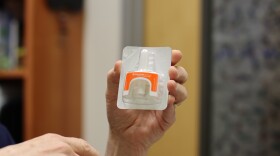
Lori Townsend
Chief Editor & Senior Vice President of JournalismLori is the chief editor, senior vice president of journalism and senior host for Alaska Public Media. She has worked in print and broadcast journalism for nearly 30 years.
Lori got her start in broadcasting at the age of 12 as the park announcer for softball games in her hometown of Deer Park, Wisconsin.
Radio brought her to Alaska in 1999 when she was hired as a broadcast trainer for Native fellowship students at Koahnic Broadcasting. She was hired by APRN as host of Alaska News Nightly and general assignment reporter in 2003. She became news director after the APRN merger with Alaska Public Media. In addition to running the newsroom, Lori hosts Talk of Alaska and Alaska Insight.
Lori is an avid reader, a rabid gardener and loves to be outside, wandering the trails of Anchorage and Southcentral.
Reach Lori at ltownsend@alaskapublic.org or 907-550-8452.
-
How can you protect yourself and your family? Online security experts join us to answer your questions on this Talk of Alaska.
-
Lori Townsend speaks with Alaska Federation of Natives leadership about their 2023 convention.
-
The rise in challenges to books in school and public libraries has grown rapidly in recent years. Efforts to censor certain topics in reading material is not new. Attempts have appeared periodically throughout history, but the American Library Association saw a 70% increase in book ban requests in 2022. We discuss what’s driving the latest spike in demands for book removals and who should decide on this Talk of Alaska.
-
Computer technology aids us daily in our work and personal lives. Banking,online ordering, education, even monitoring your blood sugar and other health conditions is now routine. These systems also track our online habits, learning about our preferences and using that data to offer similar types of products or other content. That’s a simple example of Artificial Intelligence, but A.I.’s use is growing fast and understanding the risks that come with the convenience is important. We’ll learn more about these cyber concerns on this Talk of Alaska
-
The Port of Alaska escaped the devastating 1964 earthquake relatively unscathed, which left it poised to take up much of the state’s cargo traffic as…
-
It has been a year of global extremes, with record breaking heat, severe drought, and unprecedented flooding. The switch to the weather pattern known as El Niño generally signals a turn toward more warming and NOAA reports that warmer than average sea surface temperatures will likely continue and may strengthen by mid winter. What might this mean for Alaska’s fall and winter storm season? We discuss the outlook and preparations on this Talk of Alaska.
-
Across Alaska, an insufficient housing supply and historically high rental and mortgage rates are pushing Alaskans into urban centers, causing them to leave the state, or forcing them into homelessness. Affordable housing is critical for health and wellbeing, and leads to better employment and education outcomes. What are the solutions to Alaska's chronic housing shortage? We talk with Alaskans focused on answers on this Talk of Alaska.
-
Alaska is one of the most seismically active places in the world. Located on the Pacific ring of fire, earthquakes and tsunami alerts are not uncommon in our state, but information about the level of concern for coastal areas can sometimes be confusing, creating more anxiety at an already stressful time. We talk with Alaska earthquake and tsunami experts to help clarify how to keep yourself safe when minutes count on this Talk of Alaska.
-
The CDC reports nearly 110,000 Americans died in 2022 from overdoses. The highly lethal drug Fentanyl was the cause for the majority of the overdose deaths and is the top illicit opioid of concern. What’s the latest information on addiction prevention, treatment and the efforts of law enforcement to stop the flow of these dangerous drugs to Alaska? We discuss combating overdose deaths and addiction on this Talk of Alaska.
-
You can get toasters, new blankets, specialty dog food and a range of other household goods through the U.S. mail from companies such as Amazon, but if you want lumber, concrete, a new dishwasher, or any of the household items found in local stores, it’s most likely entering the state and coming to your community through the Port of Alaska, where the vast majority of all incoming Alaska supplies are received. The port is undertaking a massive modernization project. We discuss what it will mean for the future of shipping to Alaska on this Talk of Alaska










